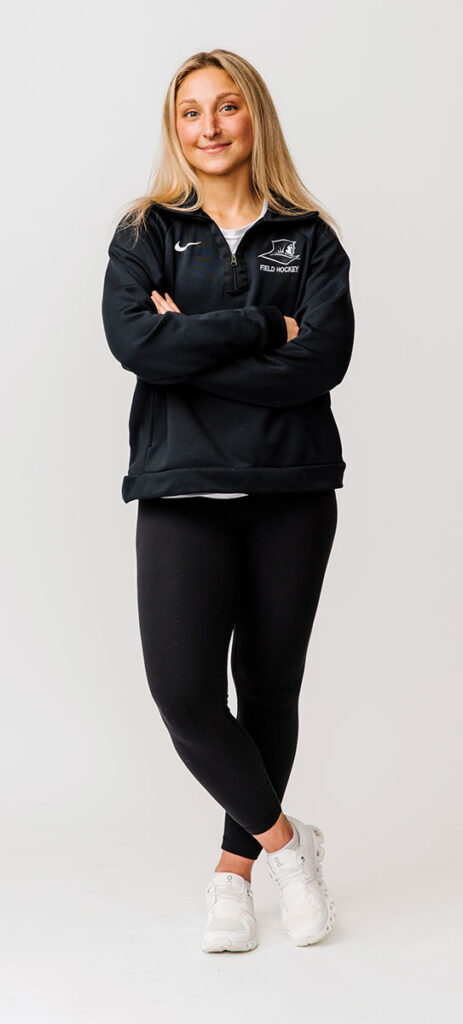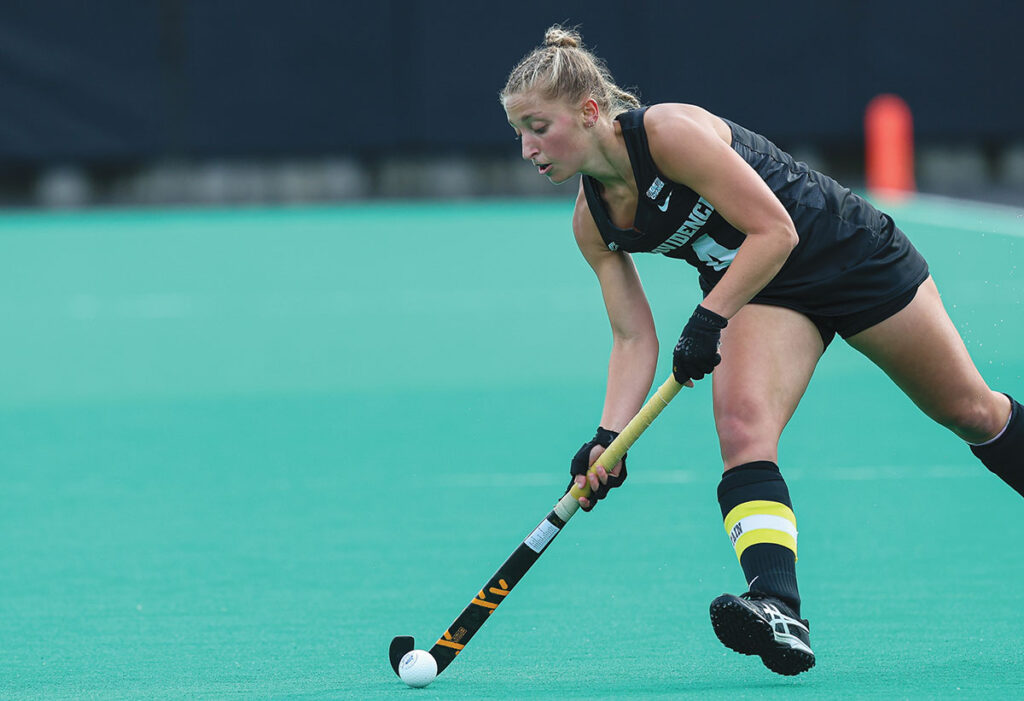The Lucky 1%
By Lisa McNamara ’23, ’24G
When I arrived at Providence College in the fall of 2019 as a member of the field hockey team, student-athletes were told, “You are the lucky 1%, the 1% who get to play their sport at the Division I level.”
Student-athletes are often reminded of this, and rightly so. We hear it from our coaches, our administrators, our strength and conditioning coaches, our parents, and others, because it is an honor and a privilege to represent Providence College. We put on the black and white uniform and give our all to the sport that we love and that has given us the opportunity to be here.
When I arrived at PC, I was also told, “You are never alone in Friartown.” John Rock, our senior associate athletic director for health and wellness, gave all new student-athletes a gray, long-sleeve “You Are Never Alone in Friartown” shirt. He told us that it wasn’t just a statement on a shirt — it was our culture at Providence, it was the Friar Family.

To be honest, I thought that the first statement, about being the lucky 1%, would be my takeaway from college: I was lucky to be at PC, to play a sport, and to spend what I thought would be four years here. And I am forever grateful for the opportunity. But through my five years as a member of the athletics program (the one silver lining of COVID-19 being an extra year of eligibility), I have come to realize that “You Are Never Alone in Friartown” is the reason I got through five years as a Division I student-athlete and, most importantly, is the reason I am a happy and confident young woman today.
Back to when I first arrived at PC. Throughout high school, where I played multiple sports, I struggled with body image and nutrition. Although it was kept somewhat under control, the demands of college athletics, with the necessity of fueling for performance, created tension within me that manifested into an eating disorder. There really is no way to describe how overwhelming my experience was. I cannot recall going more than 30 minutes without thinking about what I was eating or going to eat, whether I perceived it to be too much, all while understanding that I needed to eat to perform and experiencing extreme guilt when giving myself the necessary fuel. Eventually it became too much, and I reached out to John Rock, a resource from that kick-off meeting earlier in the year. Instantly, he began supporting me. He connected me with a nutritionist and with a clinical psychologist for student-athletes in the Personal Counseling Center, and talked with my athletic trainer and my coaches, who above everything care about us as human beings.
But recovery is not linear. I had resources in place, but COVID-19’s arrival in March 2020 certainly did not help. After a first-year season where I had playing time, in sophomore year, because of my illness, I rarely saw the field. That lack of playing time motivated me to return for my junior year recovered, healthy, and ready to perform at the Division I level. I worked relentlessly to rewire my brain and my thoughts around food and body image. This work didn’t just occur during sessions with my counselor and a nutritionist. Every day I had to commit to learning and doing what was best for me and my health. I wouldn’t have been able to do it without support from our athletics department, Coach Diane Madl, and my teammates. From my junior season to my fifth-year season, I was honored to start every game, serve as team captain for two years, and give my all to my team, the sport, and the field hockey program.
It has been one of the greatest blessings and privileges of my life to be a member of Providence College field hockey. I know that the athletics department’s commitment to ensuring “You Are Never Alone in Friartown” — that all student-athletes develop as human beings successful and joyful in life beyond our sports — is what really made me “the lucky 1%.”
Lisa McNamara ’23, ’24G, from Barre, Vermont, majored in global studies with minors in business and innovation and in Black studies. While completing an MBA degree, she worked as a graduate assistant in the Office of Student Athlete Development supporting the Friar Edge program, which helps student-athletes develop as learners, leaders, and citizens.






